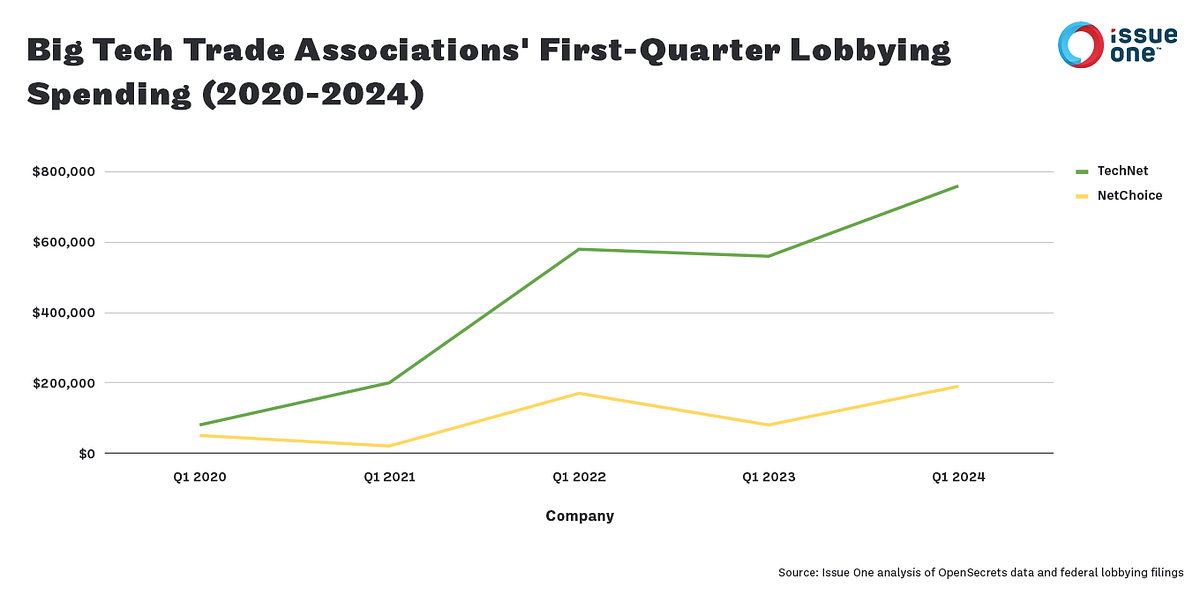Big Tech's Aggressive Lobbying Faces Growing Bipartisan Pushback for Online Safety and Antitrust Reforms
Core Concepts
Despite aggressive lobbying and influence tactics, Big Tech companies are facing increasing bipartisan pressure and regulatory scrutiny over online safety, antitrust, and consumer protection issues.
Abstract
The content discusses the ongoing battle between Big Tech companies and policymakers over regulatory reforms. It highlights several key developments:
-
Senators Patty Murray and Jeanne Shaheen fought to fully fund the DOJ antitrust division, against the wishes of Big Tech. Majority Leader Chuck Schumer also called votes on the Kids Online Safety Act (KOSA) and the Children's and Teens Online Protection Act (COPPA), which aim to address issues like gun violence videos, misinformation, and self-harm content on social media platforms.
-
Industry groups like NetChoice, TechNet, and the Computer & Communications Industry Association (CCIA) have actively worked to kill or block child safety bills at the state and federal level. They have used tactics like misrepresenting their identities and affiliations.
-
However, the tide is turning, with increased enforcement actions by the DOJ and FTC against Big Tech companies for privacy, antitrust, and labor law violations. Bipartisan support for reining in Big Tech's influence is growing, with Republican voters and officials also voicing concerns.
-
In response, tech billionaires and lobbyists are aggressively lobbying and spending millions on campaign contributions to try to reverse the regulatory momentum. But the content suggests that the "march ahead will be uphill" as the public and policymakers are increasingly ready to address Big Tech's power and harms.
Translate Source
To Another Language
Generate MindMap
from source content
Big Tech Bravado Confronts Reality
Stats
Big Tech spent $68 million on lobbying in 2022.
66% of Republicans believe major tech companies have too much political influence.
62% of Republicans support government regulations to prevent monopolies and ensure fair competition.
Quotes
"They are on the march, but the march ahead will be uphill. Majorities of policymakers and voters agree that Big Tech wields too much power over American life."
"To take on Big Tech's tight grip on the consumer market, and firm control over what things cost and where we can buy them. To protect small businesses and the free market. Washington may have been slow confront these problems, but not all the armies of lobbyists in the world can stop an idea whose time has come."
Deeper Inquiries
How can policymakers ensure that regulatory reforms targeting Big Tech are effective and not undermined by industry influence and lobbying?
To ensure that regulatory reforms targeting Big Tech are effective and not undermined by industry influence and lobbying, policymakers can implement several key strategies. Firstly, transparency in the legislative process is crucial. By making all interactions between policymakers and industry lobbyists public and easily accessible, policymakers can increase accountability and reduce the potential for backdoor deals. Additionally, imposing strict limits on campaign contributions and revolving door practices can help mitigate the influence of industry money on regulatory decisions. Policymakers should also prioritize input from a diverse range of stakeholders, including consumer advocacy groups, small businesses, and independent experts, to ensure that regulatory reforms are comprehensive and balanced. Finally, ongoing monitoring and evaluation of the regulatory framework, coupled with strong enforcement mechanisms, are essential to prevent circumvention of the rules by Big Tech companies.
What are the potential unintended consequences of increased government intervention in the tech sector, and how can they be mitigated?
Increased government intervention in the tech sector can lead to several potential unintended consequences. One major concern is the stifling of innovation due to overly burdensome regulations that may deter new entrants and startups from entering the market. Moreover, heavy-handed regulations could inadvertently favor larger tech companies with the resources to comply, further entrenching their dominance. To mitigate these risks, policymakers should adopt a flexible regulatory approach that fosters competition and innovation while addressing specific harms caused by Big Tech. Regulatory impact assessments should be conducted to evaluate the potential consequences of new regulations and make adjustments as needed. Collaboration with industry stakeholders and ongoing dialogue can also help identify and address unintended consequences in a timely manner.
How might the growing public and bipartisan scrutiny of Big Tech's power shape the future of innovation and competition in the technology industry?
The growing public and bipartisan scrutiny of Big Tech's power is likely to have a significant impact on the future of innovation and competition in the technology industry. As concerns about data privacy, antitrust violations, and misinformation continue to mount, policymakers are under increasing pressure to take action to rein in Big Tech companies. This scrutiny may lead to the implementation of stricter regulations aimed at promoting competition, protecting consumer rights, and ensuring a level playing field for all market participants. By holding Big Tech companies more accountable for their actions, policymakers can create a more conducive environment for smaller competitors and startups to thrive, fostering innovation and diversity in the tech sector. Additionally, increased scrutiny may encourage Big Tech companies to adopt more responsible business practices and prioritize the interests of users and society as a whole, ultimately leading to a more ethical and sustainable tech industry.

